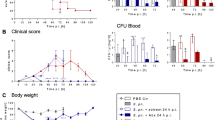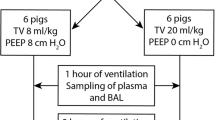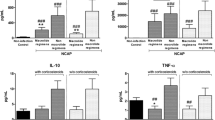Abstract
Objective
To examine the effect of intratracheal heparin instillation on Legionella pneumophila-related acute lung injury (ALI) and systemic dissemination.
Design
Prospective, controlled experimental study.
Setting
University research laboratory.
Interventions
A/J mice received 5 μg of sulfated heparin intratracheally co-instilled with 106 or 108 colony-forming units (CFU) of a virulent isolate of L. pneumophila.
Measurements and results
ALI was assessed in control groups (PBS and PBS-heparin) and on days 1, 2 and 3 post-infection, in terms of the lung wet-to-dry (W/D) weight ratios and of lung endothelial permeability to radio-labeled albumin (Perm-I125). Lung bacterial loads were measured and systemic spread was assessed by blood and target organ culture. The alveolar inflammatory response was evaluated by measuring the cytokine levels (TNF-α, IFN-γ, IL-6 and IL-12p70) in bronchoalveolar lavage fluids (BALF). Co-instilled heparin improved mouse survival after the 108 CFU challenge (p < 0.01). On day 2, heparin co-instillation significantly reduced the W/D ratio and Perm-I125 (p < 0.01 and p < 0.001 respectively), improved lung bacterial clearance (p < 0.001), prevented systemic dissemination (blood, liver, spleen, kidneys and brain cultures, all p < 0.05) and significantly increased IFN-γ and IL-12p70 levels in BALF (p < 0.05).
Conclusions
Heparin co-instillation during intratracheal L. pneumophila challenge has a protective effect on the alveolar–capillary barrier and prevents bacterial dissemination. These results tend to confirm the competitive inhibition by heparin of L. pneumophila attachment to lung epithelium in vivo, and point to the possible involvement of a heparan-sulfate adhesin in L. pneumophila binding to pneumocytes.




Similar content being viewed by others
References
Benin AL, Benson RF, Besser RE (2002) Trends in Legionnaire's disease, 1980–1998: declining mortality and new patterns of diagnosis. Clin Infect Dis 35:1039–1046
Fields BC (2002) Legionella and Legionnaires'disease: 25 years of investigation. Clin Microbiol Rev 15:506–526
Molofski AB, Swanson MS (2004) Differentiate to thrive: lessons from the Legionella pneumophila life cycle. Mol Microbiol 53:29–40
Mody CH, Paine R IIId, Shahrabadi MS, Simon RH, Pearlman E, Eiser BI, Toews GB (1993) Legionella pneumophila replicates within rat alveolar epithelium. J Infect Dis 167:1138–1145
Gao LY, Stone BJ, Brieland JK, Abu Kwaik Y (1998) Different fates of Legionella pneumophila pmi and mil mutants within macrophages and alveolar epithelial cells. Microb Pathog 25:291–306
Bernard GR, Artigas A, Brigham KL, Carlet J, Falke K, Hudson L, Lamy M, Legall JR, Morris A, Spragg R (1994) The American-European consensus conference on ARDS. Definitions, mechanisms, relevant outcomes and clinical trial coordination. Am J Crit Care Med 149:818–824
Ware LB, Matthay MA (2000) The acute respiratory distress syndrome. N Engl J Med 342:1334–1349
Parker JC, Townsley MI (2004) Evaluation of lung injury in rats and mice. Am J Physiol Lung Cell Mol Physiol 286:L231–L246
Wiener-Kronish JP, Franck D, Sawa T (2001) In: Wong HR, Shanley TP (eds) Molecular biology of acute lung injury. Kluwer Academic, Boston, pp 149–161
Brieland J, Freeman P, Kunkel R, Chrisp C, Hurley M, Fantone J, Engleberg C (1994) Replicative lung infection in intratracheal inoculated A/J mice. A murine model of human Legionnaires' disease. Am J Pathol 145:1537–1546
Newton C, McHugh S, Widen R, Nakachi N, Klein T, Friedman H (2000) Induction of interleukin-4 (IL-4) by Legionella pneumophila infection in BALB/c mice and regulation of tumor necrosis factor alpha, IL-6, and IL-1β. Infect Immun 68:5234–5240
Susa M, Ticac B, Rukavina T, Doric M, Marre R (1998) Legionella pneumophila infection in intratracheally inoculated T cell-depleted or -nondepleted A/J mice. J Immunol 160:316–321
Tateda K, Matsumoto T, Ishii Y, Furuya N, Onho A, Miyazaki S, Yamaguchi K (1998) Serum cytokines in patients with Legionella pneumophila: relative predominance of Th1-type cytokines. Clin Diag Lab Immunol 5:401–403
Brieland JK, Freeman DG, Hurley DC, Fantone JC, Engleberg NC (1995) In vivo regulation of replicative Legionella pneumophila lung infection by endogenous tumor necrosis factor alpha and nitric oxide. Infect Immun 63:3253–3258
Thomas RJ, Brooks TJ (2004) Oligosaccharide receptor mimics inhibit Legionella pneumophila attachment to human respiratory epithelial cells. Microb Pathog 36:83–92
Yaradou DF, Raze D, Ginevra C, Ader F, Doléans A, Vandenesch F, Menozzi FD, Etienne J, Jarraud S (2007) Zinc dependent cytoadherence of Legionella pneumophila on human alveolar epithelial cells. Microb Pathog 43:234–242
Menozzi FD, Pethe K, Bifani P, Soncin F, Brennan MJ, Locht C (2002) Enhanced bacterial virulence through exploitation of host glycosaminoglycans. Mol Microbiol 43:1379–1386
Cazalet C, Rusniok C, Brüggemann H, Zidane N, Magnier N, Ma L, Tichit M, Jarraud S, Bouchier C, Vandenesch F, Kunst F, Etienne J, Glaser P, Buchrieser C (2004) Evidence in the Legionella pneumophila genome for exploitation of host cell functions and high genome plasticity. Nat Gen 36:1165–1173
Nguyen TMN, Ilef D, Jarraud S, Rouil L, Campese C, Che D, Haeghebaert S, Ganiayre F, Marcel F, Etienne J, Desenclos JC (2006) A community-wide outbreak of Legionnaires disease linked to industrial cooling towers. How far can contaminated aerosols spread? J Infect Dis 193:102–111
Jayr C, Garat C, Meignan M, Pittet JF, Zelter M, Matthay MA (1994) Alveolar liquid and protein clearance in anesthetized ventilated rats. J Appl Physiol 76:2636–2642
Garrigo J, Danta I, Ahmed T (1996) Time course of the protective effect of inhaled heparin on exercise-induced asthma. Am J Respir Crit Care Med 153:1702–1707
Bendstrup KE, Chambers CB, Jensen JI, Newhouse MT (1999) Lung deposition and clearance of inhaled 99mTc-heparin in healthy volunteers. Am J Respir Crit Care Med 160:1653–1658
Molmeret M, Bitar DM, Han L, Abu Kwaik Y (2004) Cell biology of the intracellular infection by Legionella pneumophila. Microbes Infection 6:129–139
Freissler E, Meyer auf der Heyde A, David G, Meyer TF, Dehio C (2000) Syndecan-1 and syndecan-4 can mediate the invasion of OpaHSPG-expressing Neisseria gonorrhoeae into epithelial cells. Cell Microbiol 2:69–82
Pethe K, Alonso S, Blet F, Delogu G, Brennan MJ, Locht C, Menozzi FD (2001) The heparin-binding haemagglutinin of M. tuberculosis is required for extrapulmonary dissemination. Nature 412:190–194
Menozzi FD, Rouse JH, Alavi M, Laude-Sharp M, Muller J, Bischoff R, Brennan MJ, Locht C (1996) Identification of a heparin-binding hemagglutinin present in mycobacteria. J Exp Med 184:993–1001
Gebran SJ, Yamamoto Y, Newton C, Klein TW, Friedman H (1994) Inhibition of Legionella pneumophila growth by gamma interferon in permissive A/J mouse macrophages: role of reactive oxygen species, nitric oxide, tryptophan, and iron III. Infect Immun 62:3197–3205
Brieland JK, Remick DG, LeGendre ML, Engleberg NC, Fantone JC (1998) In vivo regulation of replicative Legionella pneumophila lung infection by endogenous interleukin-12. Infect Immun 66:65–69
Deng JC, Tateda K, Zeng X, Standiford TJ (2001) Transient transgenic expression of gamma interferon promotes Legionella pneumophila clearance in immunocompetent hosts. Infect Immun 69:6382–6390
Levi M, Ten Cate H (1999) Disseminated intravascular coagulation. N Engl J Med 34:586–592
Fourrier F, Chopin C, Goudemand J, Hendrycs S, Caron C, Rime A, Marey A, Lestavel P (1992) Septic shock, multiple organ failure, and disseminated intravascular coagulation. Compared patterns of antithrombin III, protein C, and protein S deficiencies. Chest 101:816–823
Bendstrup KE, Gram J, Jensen JI (2002) Effect of inhaled heparin on lung function and coagulation in healthy volunteers. Eur Respir J 19:606–610
Tasaki O, Mozingo DW, Dubick MA, Goodwin CW, Yantis LD, Pruitt BA (2002) Effects of heparin and lisofylline on pulmonary function after smoke inhalation injury in an ovine model. Crit Care Med 30:637–643
Jordan RE, Nelson RM, Kilpatrick J, Newgren JO, Esmon PC, Fournel MA (1989) Antithrombin inactivation by neutrophil elastase requires heparin. Am J Med 87:19S–22S
Rao LV, Nordfang O, Hoang AD, Pendurthi UR (1995) Mechanism of antithrombin III inhibition of factor VIIa/tissue factor activity on cell surfaces. Comparison with tissue factor pathway inhibitor/factor Xa-induced inhibition of factor VIIa/tissue factor activity. Blood 85:121–129
Laterre PF, Wittebole X, Dhainaut JF (2003) Anticoagulant therapy in acute lung injury. Crit Care Med 31:S329–S336
Laterre PF, Garber G, Levy H, Wunderink R, Kinasewitz GT, Sollet JP, Maki DG, Bates B, Yan SC, Dhainaut JF; PROWESS Clinical Evaluation Committee (2005). Severe community-acquired pneumonia as a cause of severe sepsis: data from the PROWESS study. Crit Care Med 33:952–961
Schultz MJ, Haitsma JJ, Zhang H, Slutsky AS (2006) Pulmonary coagulopathy as a new target in therapeutic studies of acute lung injury or pneumonia. A review. Crit Care Med 34:871–877
Acknowledgements
This study was supported by grants from Collège français des universitaires de Maladies Infectieuses et Tropicales (CMIT) and by Agence française de sécurité sanitaire de l’environnement et du travail (Afsset). The authors thank Dr. Bruno Cardinaud and Dr. Elizabeth Pradel for substantial assistance with work relevant to the study and David Young for editing the manuscript.
Author information
Authors and Affiliations
Corresponding author
Additional information
Franco Dante Menozzi has died since this study was conducted.
Rights and permissions
About this article
Cite this article
Ader, F., Le Berre, R., Fackeure, R. et al. In vivo effect of adhesion inhibitor heparin on Legionella pneumophila pathogenesis in a murine pneumonia model. Intensive Care Med 34, 1511–1519 (2008). https://doi.org/10.1007/s00134-008-1063-2
Received:
Accepted:
Published:
Issue Date:
DOI: https://doi.org/10.1007/s00134-008-1063-2




